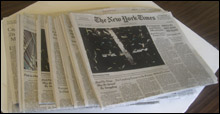 Seymour Hersh’s April 17 New Yorker article, which reported that a “messianic” Bush White House was contemplating regime change and tactical nuclear strikes to pre-empt Iran’s bomb-building program, landed with its own explosive power last week.
Seymour Hersh’s April 17 New Yorker article, which reported that a “messianic” Bush White House was contemplating regime change and tactical nuclear strikes to pre-empt Iran’s bomb-building program, landed with its own explosive power last week. The stunning revelations — which may have inadvertently exaggerated fears about Iran’s nuclear program — put the issue back in the headlines and triggered a confusing scramble to determine how much time the US has to prevent the emergence of a nuclear-armed Iran. A Washington Post editorial cited an estimate as short as three years down the road. A Bloomberg story quoted a State Department official saying Iran could make enough enriched uranium for a nuke in 16 days.
But on April 13, a front-page article in the New York Times cited the view of “western nuclear analysts” that Iran is years away — perhaps even more than a decade away — from being able to produce nuclear weapons. It was a story whose symbolic meaning may have outstripped its journalistic value.
On one level, the Times story seemed timed to cool a dramatic onset of war jitters. But it may also have sent a crucial message about how — in the wake of their haunting failure to examine the administration’s rationale for the war in Iraq — the mainstream media will treat another effort to push military action against another Mideast state on the grounds that it will soon possess WMD.
The run-up to the 2003 Iraq war did major damage to the reputation and credibility of the Times. Ultimately, the paper offered its readers a formal mea culpa for its failure to scrutinize dubious claims about Saddam Hussein’s WMD and saw one of its stars — reporter Judy Miller — discredited for her role in hyping those claims.
On April 13, the paper seemed to be signaling that it, and perhaps the rest of the media, would treat a run-up to war with Iran with the kind of aggression and skepticism that was missing three years ago.
Walter Shapiro, Washington bureau chief for Salon, acknowledges that if Iran is now in the cross hairs, chastened journalists may skip skeptical and head directly for cynical.
“We make a mistake and then we totally overcompensate for it,” he says, adding that in the case of Iran, “they would literally have to test a weapon to dampen the [media] skepticism about the threat.”
Adds Sig Christenson, president of the Military Reporters and Editors (MRE) association: “What I pray is we all get our feet on the ground and have a serious debate — and not have this insane war fever we had last time around.”
Why Iran isn’t Iraq
“I think both the military and to some extent the media ... tend to fight the previous war,” says James Crawley, the vice-president of MRE.
In fact, the developing situation with Iran differs in crucial ways from the Iraq conflict. For one thing, Iranian leaders are touting, not denying, their interest in nuclear technology. For another, the country has the kind of coherent national identity and strategic resources that Iraq lacked. It’s also possible that Iran’s theocratic leadership, considered out of touch with much of the populace, may be less pragmatic, more unpredictable, and more dangerous than Hussein.
Despite those differences, it will be hard for the media to forget the mistakes of the previous war.
Aside from the Times’ May 2004 note to readers, outlets such as the Washington Post and the New Republic also admitted failure in not vetting more closely the Bush administration’s rationale for war.
That collective sense of guilt and failure — combined with a determination, as the Who once put it, that we don’t get fooled again — is bound to influence the tenor of coverage if the prospect of conflict with Iran grows.
Shapiro recalls a column he wrote for USA Today basically lauding the job done by former Secretary of State Colin Powell during his February 2003 speech to the UN making the case that Iraq had WMD. (Powell himself later called that presentation a “blot” on his record.”) “I feel embarrassed by [that column],” Shapiro admits now. “I think there is such a level of feeling burned” on the part of the press.